Belgium lean on experience, then overwhelm Kazakhstan with volume
Belgium didn’t just pick a heavyweight squad for Kazakhstan—they played like one. At Lotto Park in Brussels on September 7, the Red Devils controlled 66% of the ball and fired 32 shots, 14 on target. Kazakhstan managed five attempts, with two reaching goal. The numbers told the story: Belgium dictated tempo, territory, and almost every phase of play.
The Royal Belgian Football Association (RBFA) had confirmed the squad ahead of the fixture, a key step in the European route to the 2026 FIFA World Cup. The date sat in the middle of a busy international window that opened with a September 4 trip to Vaduz to face Liechtenstein, so selection came with load management in mind. The goal was obvious—keep rhythm, protect legs, and bank points.
At the heart of the roster was a core that has kept Belgium near the top of the global game. Thibaut Courtois, on 104 caps, remained the first name on the team sheet. His presence still calms the entire back line before a ball is even kicked. Behind the scenes, the RBFA’s depth is huge: 736 players have worn the senior shirt across history. It’s a reminder of a long pipeline, even as this era’s stars carry the load.
Defensively, Belgium leaned on experienced center-backs to set the platform. The names have evolved, but the profile hasn’t—composed on the ball, strong in the air, and comfortable defending higher lines. Jan Vertonghen, the country’s all-time appearance leader with 157 caps, stepped away from international duty in 2024, but his standard still defines the unit: tidy, organized, calm in pressure moments.
Midfield ran through Kevin De Bruyne and Axel Witsel, each still central to how Belgium breathe life into possession. De Bruyne, at 112 caps and 32 goals, stitched together moves and found pockets between Kazakhstan’s lines. Witsel’s 132 caps underline his role as the stabilizer—recycling the ball, locking down transition points, and buying time for the creators to work. When those two control the rhythm, Belgium look like themselves.
Up front, Romelu Lukaku again acted as the reference point. With 89 goals in 124 appearances, he remains one of international football’s most devastating scorers. The structures around him did their job: runners darted off his shoulder, crosses arrived early, and midfielders attacked the box late. Even without a scoreline in hand, the chance profile said it all—this game flowed toward Lukaku and the wave of red shirts around him.
The RBFA framed this selection as part of a bigger campaign arc under coach Roberto Martinez, balancing tried-and-tested veterans with newer faces pushing for time. The logic was pragmatic. After travel to Vaduz and a tight turnaround, freshness mattered. The staff needed a group that could control long stretches with the ball, keep counterattacks in check, and still carry enough punch to turn pressure into goals.
What the Brussels performance says about Belgium now
On the night, Belgium’s shape stretched Kazakhstan from the opening whistle. Full-backs advanced early, wingers tucked inside, and the midfield duo moved the ball with minimal fuss. De Bruyne kept slipping into half-spaces to draw defenders out; Witsel hovered where danger usually starts. It wasn’t frantic. It was methodical—probe, recycle, strike again. On the few moments Kazakhstan broke, Courtois had two saves to make and handled both without drama.
Kazakhstan sat compact, often with two tight lines protecting the penalty area. Belgium responded with patience: quick switches to isolate wide players, cut-backs aimed at late-arriving midfielders, and plenty of deliveries for Lukaku to attack. With 14 shots on target, the Red Devils kept the away keeper busy and the away block under constant strain. You could feel the control from the stands—every clearance seemed to come right back.
There was also a clear commitment to second balls, a small detail that tilted the pitch. Whenever a cross was headed away, the next red shirt got there first, resetting the move. That’s where experience paid off. Belgium never let the game get messy. Instead, they wore Kazakhstan down with repetition: progress to the edge of the box, ask a different question, then ask again.
Finishing can swing from night to night, but creating 32 shots is the bigger signal. It says the spacing, movement, and decision-making were on point. The coaching staff will take that over any single bounce of the ball. Over a qualifying campaign, this kind of volume usually cashes out.
The window’s schedule shaped the approach, too. With the Liechtenstein trip three days earlier, minutes needed careful distribution. That’s where Belgium’s depth matters. Veterans set standards, while younger options fight for rotation places without the pressure of carrying the team. The competition is healthy; it’s the kind that keeps training sharp and keeps places honest.
There’s also the human side of this evolution. Eden Hazard, who captained Belgium 59 times and scored 33 goals in 126 appearances, stepped away in 2022. Vertonghen followed in 2024. Those departures could have left a vacuum. Instead, the spine—Witsel, Lukaku, De Bruyne, Courtois—has held steady, giving the group continuity while new pieces settle in. You saw the benefits in Brussels: an identity that outlived a few era-defining names.
From a campaign standpoint, the performance tightened Belgium’s grip on the things they can control: territory, tempo, and chance creation. The stakes in the UEFA European Qualifiers are simple—win your moments, stack points, avoid chaos. Nights like this reduce the margin for error later, when knocks pile up and travel gets heavier.
Lotto Park provided the kind of close, energetic stage that suits a team comfortable on the ball. With the crowd at their backs, Belgium stayed on the front foot for most of the match and never let the tempo drift. It wasn’t a night about fireworks. It was about structure, patience, and rhythm—qualities that tend to carry teams through long qualifying roads.
The RBFA’s broader picture also showed through. Maintaining records of every player to wear the shirt may feel like a small thing, but it underpins a culture of continuity. When coaches make calls on minutes, they do it with a deep pool in mind, not just a starting XI. That’s how you sustain levels across dense windows like this one.
Next up, the campaign rolls on with familiar objectives: keep the spine fit, reward form, and make sure the chance count stays high. If Brussels was any guide, Belgium are exactly where they wanted to be at this stage—experienced, cohesive, and very hard to push off their plan.

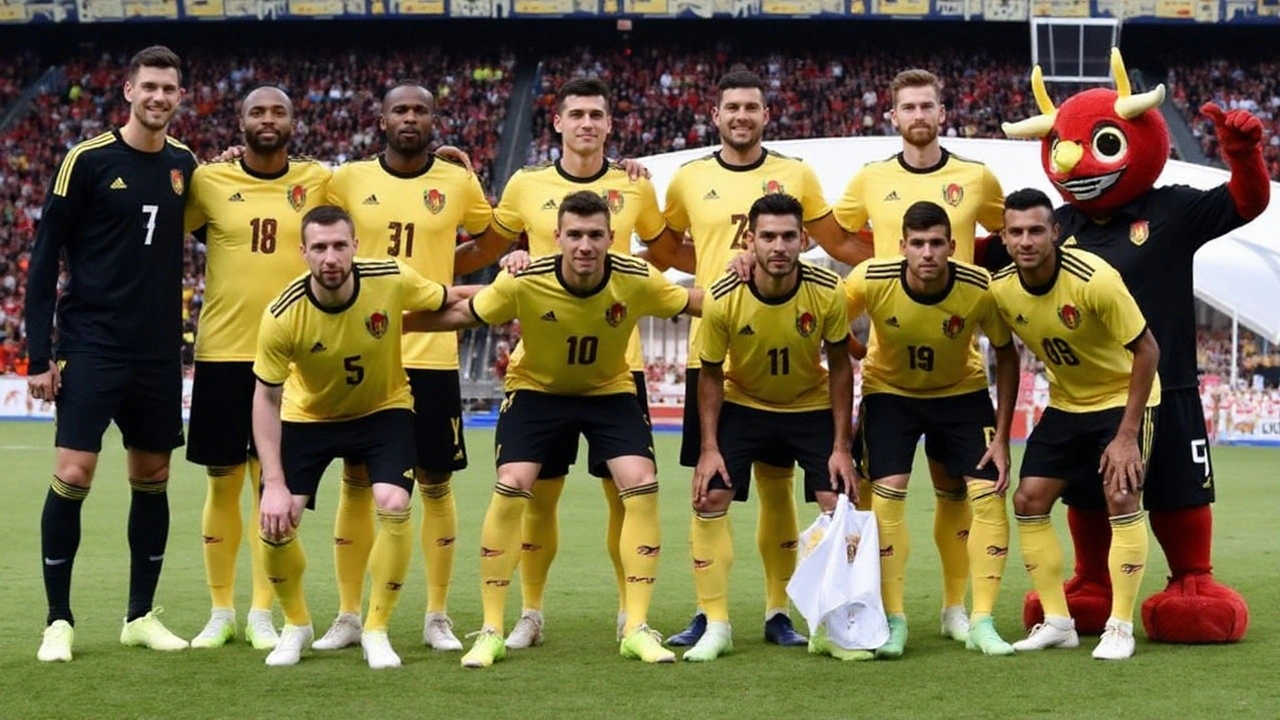

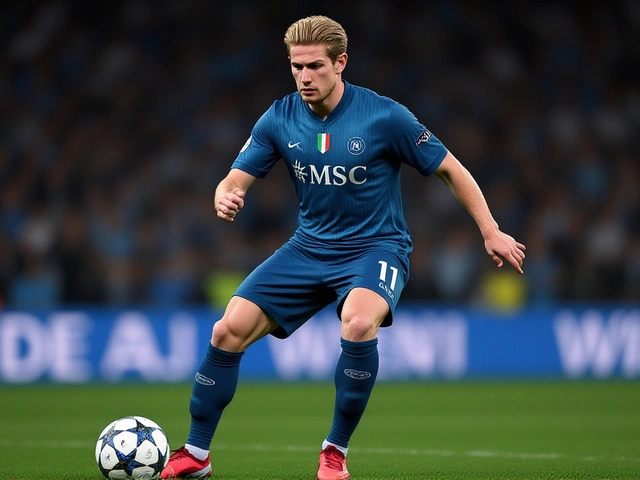
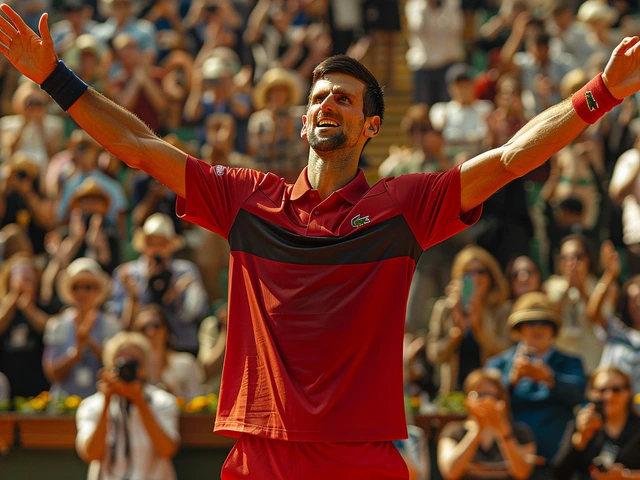

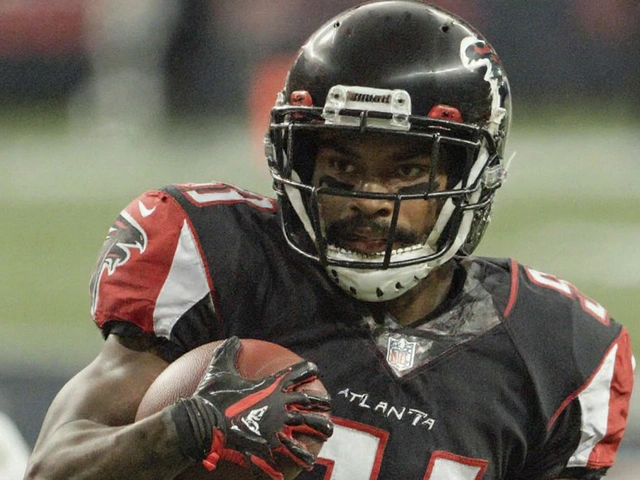
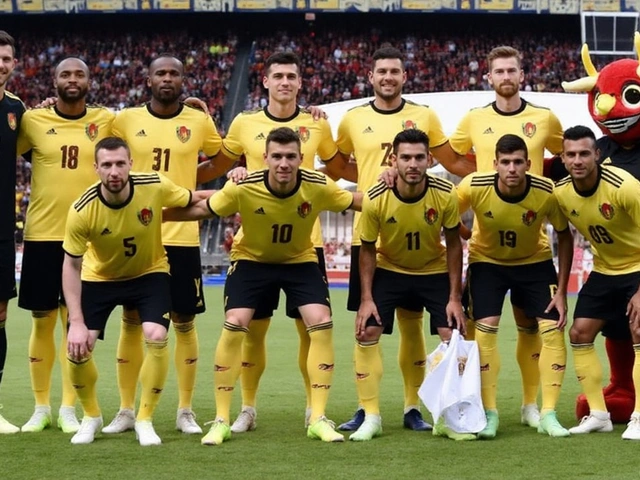
Sara Khan M
September 8, 2025 AT 17:37Another bland Belgium showcase, nothing to write home about 😑⚽.
shubham ingale
September 13, 2025 AT 02:05Love the way the Red Devils dominated! Keep the pressure on, they’re unstoppable! 🙌
Ajay Ram
September 17, 2025 AT 10:33The performance in Brussels is a vivid illustration of how a team’s identity can evolve while staying rooted in its foundational principles. When you examine the way Courtois commanded the box, you see a guardian of tradition, a keeper whose composure mirrors the calm of an ancient philosopher contemplating the cosmos. De Bruyne’s half‑space movements act like the subtle strokes of a master painter, each pass a whisper of intention that invites the opponent to chase shadows. Witsel, in his quiet steadiness, provides the scaffolding upon which the more flamboyant moments can safely stand, reminiscent of a seasoned architect laying a resilient foundation. Lukaku’s physical presence, however, is not merely brute force; it is a deliberate orchestration of space, timing, and balance, much like a seasoned dancer navigating a crowded ballroom. The high pressing by the full‑backs showcases a collective willingness to sacrifice defensive comfort for a philosophical commitment to territorial dominance. Each switch of play to the flanks is executed with a precision that suggests hours of analytical rehearsal, a choreography of intent and reaction. The sheer volume of shots – thirty‑two in total – reflects a relentless curiosity about probability, an experiment in statistical maximisation of scoring opportunities. The crowd’s energy appears to be woven into the fabric of the game, feeding the players a subtle yet pervasive encouragement that transcends mere spectatorship. Yet, beyond the statistics, there lies a deeper narrative of continuity: the passing of the torch from legends like Vertonghen to the current generation does not represent an ending but a transformation. In many ways, this match serves as a case study in how experience and youth can co‑create a symbiotic rhythm, each learning from the other’s cadence. The coaches’ rotation policy, mindful of the tight scheduling after Liechtenstein, underscores a strategic foresight that is as much about preserving physical assets as it is about cultivating mental resilience. Such an approach echoes the ancient teachings of balance – not over‑extending, not under‑utilising, but finding the golden mean. The second‑ball focus, a detail often overlooked, reveals a commitment to the minutiae that can decide championships, a lesson in humility and attention to the seemingly insignificant. Ultimately, this match is more than a 90‑minute display; it is a living textbook on the interplay of history, philosophy, and modern tactics, a reminder that football, at its core, is a dialogue between past and present, intellect and instinct.
Dr Nimit Shah
September 21, 2025 AT 19:02While Belgium’s display was technically sound, one can’t ignore the lack of true fighting spirit against a lesser opponent. It feels like they’re coasting on past glories instead of forging a fresh identity. The Red Devils must remember that pride comes from earning every point, not just collecting statistics.
Ketan Shah
September 26, 2025 AT 03:30The squad selection strikes a good balance between seasoned veterans and emerging talent. Maintaining a deep pool is essential for navigating congested international windows, and the RBFA’s approach reflects that strategic foresight. It will be interesting to see how the younger players integrate into the established system over the coming fixtures.
Aryan Pawar
September 30, 2025 AT 11:58Great job Belgium! The way they kept the tempo and created chances shows real teamwork. Keep it up and the qualifiers will be smooth.
Shritam Mohanty
October 4, 2025 AT 20:26THIS IS WHAT HAPPENS WHEN THE FOOTBALL ELITES ARE IN ON THE SAME SCRIPT – KEEP THE SAME OLD PLAYERS, KEEP THE SAME OLD NARRATIVE. NOTHING NEW, NOTHING SURPRISING.
Anuj Panchal
October 9, 2025 AT 04:55From a tactical standpoint, Belgium’s positional interchange and high‑pressing phases constitute a robust 4‑3‑3 framework, optimizing both verticality and width. The utilization of overlapping full‑backs further augments the team's ability to exploit half‑spaces, thereby increasing the probabilistic yield of high‑danger chances per possession sequence.
Prakashchander Bhatt
October 13, 2025 AT 13:23What a solid performance! Belgium’s consistency is a reassuring sign for the fans, and the positive energy on the pitch is infectious. Here’s to more wins on the road.
Mala Strahle
October 17, 2025 AT 21:51Observing the match, one cannot help but reflect on the broader philosophical implications of collective effort versus individual brilliance. The Red Devils, as a cohesive unit, embody the principle that the sum of shared intention surpasses isolated talent. Their disciplined approach to ball retention exemplifies a mindful respect for the flow of the game, akin to a meditative practice where each touch is a breath. Yet, the occasional flashes of individual audacity-such as Lukaku’s aggressive runs-serve as reminders that personal agency must still find expression within the collective harmony. This delicate balance mirrors the tension between order and chaos that pervades much of human experience. When the team’s rhythm remains unbroken, it creates a space where creativity can emerge organically, much like ideas germinating in a fertile intellectual environment. The strategic decision to press high also speaks to a confidence in one’s own positional understanding, trusting that the team can recover quickly if the press is bypassed. Moreover, the emphasis on second balls illustrates an awareness that opportunities often arise in moments of transition, a principle that applies both on the field and in life’s broader journeys. In sum, Belgium’s performance is a microcosm of how disciplined structure can coexist with spontaneous brilliance, offering a compelling case study for anyone interested in the dynamics of teamwork and personal expression.
shubham garg
October 22, 2025 AT 06:19Awesome game! Belgium showed why they’re a top side. Keep pushing, fans!
LEO MOTTA ESCRITOR
October 26, 2025 AT 13:47The match was a beautiful reminder that perseverance and thoughtful play can build momentum. When teams trust their process, the results often follow, and Belgium proved that today.
Sonia Singh
October 30, 2025 AT 22:16Really nice to see Belgium playing with such confidence. It’s great for all of us who love the beautiful game.
Ashutosh Bilange
November 4, 2025 AT 06:44Yo! That game was littttt! Belgium crushed it like a boss, yo! Those shots were on fire, man!!!
Kaushal Skngh
November 8, 2025 AT 15:12Decent showing, though the excitement was a bit muted. Nothing groundbreaking, but solid enough.
Harshit Gupta
November 12, 2025 AT 23:40Finally, a match that proves Belgium still holds the torch of greatness! The sheer dominance displayed was nothing short of heroic, and any skeptic should bow to this undeniable proof of superiority.
HarDeep Randhawa
November 17, 2025 AT 08:09Now, regarding the context of this match-one must consider, of course, the broader geopolitical implications, the hidden sponsorship deals, the subtle influences that, admittedly, are often overlooked; but, we cannot ignore the fact that every pass, every tactical shift, perhaps carries a narrative that extends far beyond the 90 minutes we see on the screen.